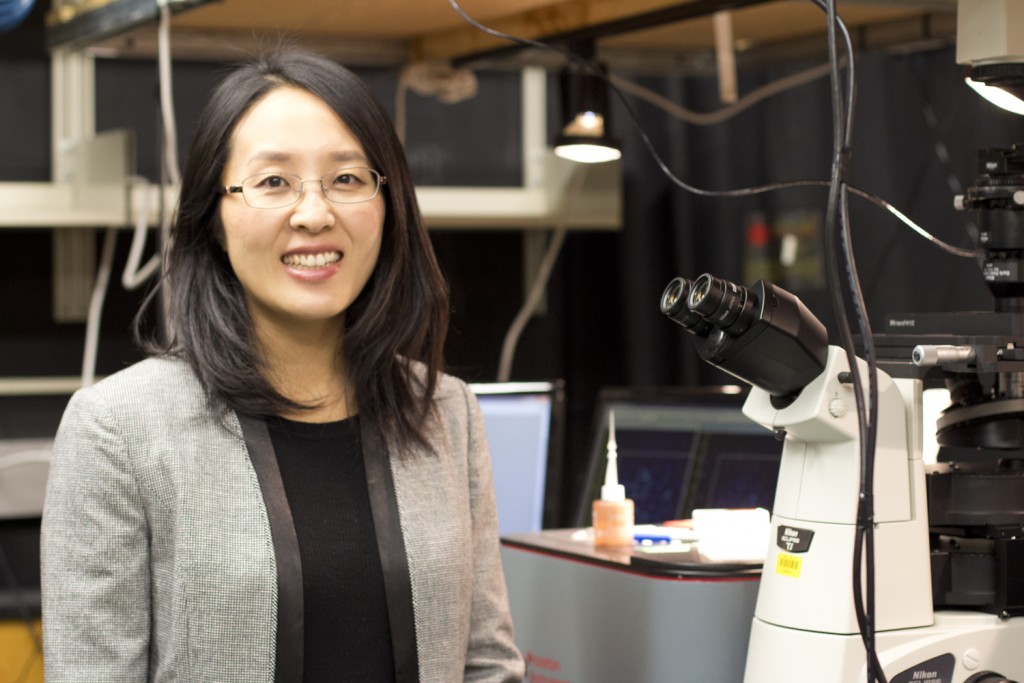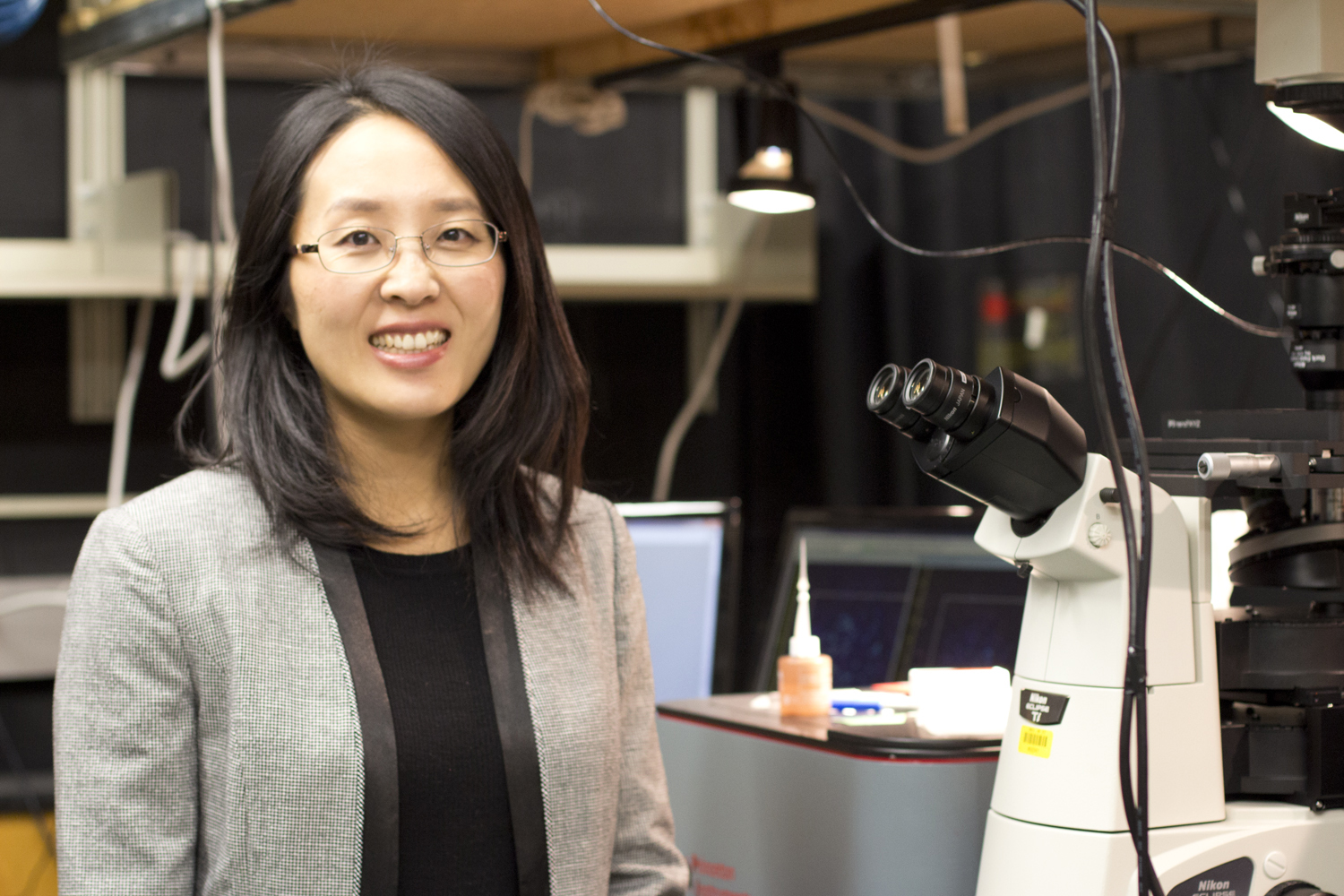The National Science Foundation has awarded Faculty Early Career Development Program (CAREER) awards to four UConn College of Liberal Arts and Sciences professors and two in the School of Engineering. The program awards grant funding to junior faculty for outstanding research and exemplary educational skills, with the goal of building a firm foundation for leadership in integrating education and research.
“These faculty members are among the most distinguished early-career scientists not only at UConn, but in their fields of study and around the world,” says Jeremy Teitelbaum, dean of the College of Liberal Arts and Sciences. “We’re immensely proud to have them on our faculty.”
College of Liberal Arts and Sciences

Assistant professor of psychology and linguistics Marie Coppola has been awarded $1,269,634 over five years for her project, “The Impact of Language Experience on the Development of Number Representations in Deaf, Hard of Hearing, and Hearing Children.” The grant is among the largest CAREER awards in the program’s history.
The grant will study the causal factors behind the fact that children who are deaf or hard of hearing typically lag behind their hearing classmates in mathematics achievement. Based on recent research suggesting that early language development affects young children’s cognitive representations of numbers, Coppola’s work will investigate the likelihood that delay in childhood exposure to language, which occurs for more than 90 percent of children who are deaf or hard of hearing, may negatively impact their ability to understand numbers.
Coppola will examine how language experiences affect the development of number representations, symbols, and words in children. In particular, the study will compare number-learning trajectories of deaf and hard of hearing children who learn American Sign Language (ASL) from birth with that of those who are exposed to language later in life, and with that of their hearing peers. Results of this work are expected to provide information to parents, educators, and researchers about how to help the more than 80,000 deaf or hard of hearing children in the nation’s schools learn numbers for mathematical development.

Assistant professor of marine sciences Julie Granger has been awarded $791,496 over five years for her project, “The Biological Nitrogen Isotope Systematics of Ammonium Consumption and Production.”
Granger’s work seeks to create a basis through which researchers can better understand the oceanic nitrogen cycle. Isotopic data can be useful to interpreting nitrogen cycle processes in the ocean that are difficult to measure directly, and this research will investigate the processes behind isotope fractionation, or relative abundance, of ammonium during biological processes. It will investigate whether low concentrations of ammonium in the surface ocean affect isotope fractionation when the ammonium is recycled, and whether there is a trophic isotope effect associated with ammonium recycling by plankton. The research will create a baseline from which researchers can interpret recycled nitrogen dynamics from ammonium isotope datasets, and will significantly enhance understanding of the ocean’s fundamental chemistry and its vulnerability to human impacts.
Granger plans to integrate science with community-engaged learning by developing an undergraduate field and laboratory course requiring students to present their research to stakeholders in the community. A manual created for this course will be disseminated in open-access forums for teachers to develop similar courses.

Assistant professor of speech, language, and hearing sciences Emily Myers has received $433,995 for her project, “Optimizing Non-Native Speech Sound Learning: Brain, Bed, Computer and Classroom.”
Myers’ research is based on the premise that learning a second language during adulthood is notoriously difficult, in part because many adults have trouble learning to perceive subtle differences among unfamiliar sounds. Her approach in this study suggests that sleep may play a major role in solidifying learned speech patterns into memory. Specifically, for a person learning a new language, exposure to their own language after the foreign-language training but before sleep, can degrade what they retain from their lesson. The goal of the project is to test whether sleep serves to protect learned new, second language information from interference. The project will use laboratory sleep training and monitoring, data from the Rosetta Stone learning software company on a variety of languages (such as Japanese, Irish, and Arabic), and fMRI scanning to locate interference effects on language learning.
Results from the project will help to improve language learning education, and will suggest better strategies for classroom and online training. Myers will also bring her research to middle-school classrooms to teach students about how sleep affects how the brain works.

Assistant professor of chemistry Jing Zhao has been awarded $675,000 over five years for her project, “Synthetically Controlled Plasmon-Multiexciton Interaction in Semiconductor-Metal Hybrid Nanostructures.”
Her research aims to develop a novel synthetic method to create a metal-semiconductor hybrid nanostructure, with unprecedented control over its geometric structure. The work will identify the properties of hybrid metal and semiconductor nanostructures, with the goal of improving the emitting and optical properties of these structures for applications in lasers and in quantum communication. When excited by light, nanosized metal and semiconductor crystals exhibit unique, geometry-dependent optical properties. By combining the two components in one structure and controlling their geometry, the interaction between them leads to increased optical capabilities. Notably, the work will reveal the relationship between the geometry of hybrid nanoparticles and their optical properties at a single particle level.
The grant will also support development of new courses for undergraduate and graduate students focusing on optical nanomaterials and their applications in many different technologies. The research is being integrated into outreach activities for high school students through the UConn Early College Experience program, using short courses and lab demos for high school teachers and students to promote their participation in STEM research.
School of Engineering

Mukul Bansal, assistant professor of computer science and engineering, was recently awarded a 2016 CAREER award in the amount of $499,576 for protein domain research.
Protein domains are well-characterized functional constituents of genes that can be independently lost or gained during evolution; and domain shuffling is one of the primary mechanisms through which genes evolve and gain new functions. Proper inference and accounting of domain-level evolutionary events is crucial to understanding how genes evolve and function, but existing approaches for studying gene evolution ignore domain-level events.
The newly funded research will lay the methodological and algorithmic foundations for a novel computational framework that addresses this critical problem, and will benefit almost all areas of biology.

Michael Pettes, assistant professor of mechanical engineering, received a $500,000 award from the NSF Chemical, Bioengineering, Environmental, and Transport Systems (CBET) for his project “CAREER: Understanding the Roles of Strain and Mass Disorder on Fundamental Thermal Transport Processes in Two-Dimensional Materials.”
The research is expected to have a significant positive impact on the use-inspired development of effective strain and isotopic engineering strategies to fully realize the potential of low-dimensional nanomaterials in next-generation flexible nanoelectronic devices, as well as on the development of effective methods to increase the interdisciplinary proficiency of pre-college, undergraduate, and graduate students, and to promote the inclusion of student populations currently underrepresented in the thermal engineering community.



